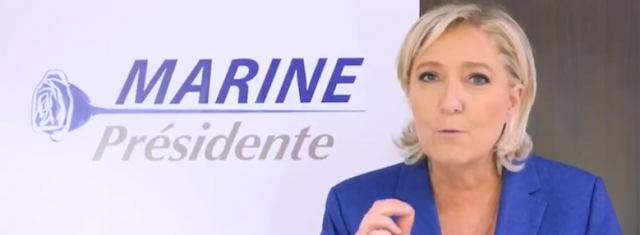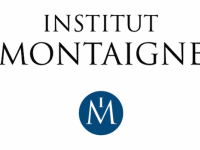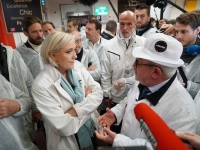Politics
PROGRAMME OF MARINE LE PEN FOR FRANCE BY INSTITUT MONTAIGNE
FRENCH THINK TANK

Marine Le Pen Banner of campaign (Source: Marine Le Pen)
USPA NEWS -
On Sunday 7th May, the French will be voting in the final round of the presidential election. They have the choice between the centrist candidate Emmanuel Macron (En Marche !) and the extreme right-wing candidate Marine Le Pen (Front National).
Institut Montaigne releases the candidates programs.
Institut Montaigne releases the candidates programs.
On Sunday, the French people will be voting in the final round of the presidential election. They have the choice between the centrist candidate Emmanuel Macron (En Marche !) and the extreme right-wing candidate Marine Le Pen (Front National).
As an independent think tank, Institut Montaigne has been actively analysing the candidates´ electoral programmes, for the citizen to understand what they are proposing for France in terms of vision and reforms. Here is the full program analysed by the Think Tank Institut Montaigne.
1. Renegotiating France´s membership in the European Union
The candidate has recently modified her position on France´s membership in the European Union (EU). Despite having based her campaign on the argument that she would lead France out of the EU and of the Eurozone, she softened her discourse over the weekend, following her alliance with Nicolas Dupont-Aignan (presidential candidate of Debout la France who was eliminated in the first round on the 23rd of April). The aim of this recent change of mind is to reach out to parts of the right-wing conservative electorate who is not favourable to Macron's election and who would otherwise be reluctant to vote for Marine Le Pen because of her strongly anti-European position.
However, her wish to renegotiate France´s EU membership and to organize an in-or-out referendum still figures in her programme. Such a procedure cannot be envisaged in the present state of national law, which only allows for a referendum to be held in order to obtain the opinion of French people on a bill (Article 11 of the Constitution) or on a revision of the Constitution (Article 89). Marine Le Pen may however consider revising the Constitution or using the mechanism of the European citizens' initiative.
If Marine Le Pen were to implement her initial proposal and trigger France´s exit from the Eurozone, the economic consequence would be disastrous: devaluation of the new Franc and loss of purchasing power for the most modest households (a depreciation of 20% would cost €2,000 per year on average for each household), loss of half a million jobs, a decline in productivity and dynamism of the French economy, an increase in interest rates and credit exhaustion. Overall, the exit from the Eurozone could create an economic recession of -2.3% in one year, and -9% in the long term.
2-INCREASING SPENDING ON JUSTICE, SECURITY AND DFENCE-------------------------------------------------------------
Marine Le Pen aims to create 40,000 additional prison places over 5 years. This measure is disproportionate to the current need of space in French prisons. In July 2016, overcrowding was measured such as requiring the creation of 10,000 places. Marine Le Pen thus proposes the creation of nearly 30,000 places that do not correspond to any need. The proposal represents an investment cost between €6.4 and €10.6 billion, to which operational costs must be added, linked in particular to the recruitment of around 25,000 additional prison guards.------------------------------------------------------------------------------------
Furthermore, Marine Le Pen wishes to increase defence spending to 2% of GDP by 2018 and to 3% of GDP by 2022. This hasty and unrealistic effort ““ other candidates during the campaign expected to reach 2% of GDP by 2025 ““ would require increasing the defence budget by €14 billion in the first year. The total additional cost of this measure would be €34.5 billion per year (with pensions) or €44.7 billion per year (excluding pensions) by 2022. In this incremental cost, the gradual restoration of compulsory military service of a minimum duration of 3 months wished by the candidate would represent a cost of around €1.6 to €3.3 billion per year, to which should be added one-off non-recurring costs (such as real estate) estimated between €2 to €4 billion related to the inadequacy of the existing structures to accommodate about 370,000 young people. France would thus join the United States, Greece, the United Kingdom, Estonia and Poland in the list of countries respecting the objective of defence effort at 2% of the GDP fixed by NATO in 2014.-------------------------------------------------
3.REFORMING FRANCE'S HEALTH POLICY--------------------------------------------------------------------------------------------
Marine Le Pen proposes to introduce a new branch of Social Security dedicated to dependency. Once envisaged during Nicolas Sarkozy´s presidency, the universal assumption of expenses related to the risk of dependence, based on estimates taken from some Scandinavian States is expected to cost €9.2 billion per year up to 2022. Marine Le Pen also wants to abolish State Medical Aid (l´Aide Médicale d´Etat), a care system granted to foreigners residing in France for more than three months, even if they do not fulfil the conditions of regularity of stay. If we estimate the savings generated by this suppression at €598 million per year, the real health risk of spreading untreated contagious diseases in the French population should not be overlooked.
4. RETURNING TO 60 YEARS FOR THE LEGAL AGE OF RETIREMENT---------------------------------------------------------
Marine Le Pen proposes to lower the legal retirement age to 60. This would apply to all employees in the private sector, as well as to the public and special schemes. Considering that such a measure amounts to cancelling the provisions adopted in the 2010 pension reform (postponement of the statutory age and lengthening of the contribution period required for a full pension), it would cost €27 billion over the entire five-year period, i.e. 1.1% of GDP. Such a postponement of the legal age would make France the country with the lowest age of entitlement in the OECD. 5. “ SIMPLIFYING' THE SYSTEM OF INTER-MUNICIPALITIES AND REGIONS------------------------------------------------------------------------------------------------
By suppressing regions and inter-municipalities, as wished by the candidate, France would have three remaining levels of administration: the municipalities (les communes), the departments (les départements) and the State.------------------------------
An analysis provided by Institut Montaigne´s research team and Eric Chaney, Economic Advisor Marine Le Pen wants to value the role and status of Mayors of small and medium-sized municipalities, simplifying the division of power, giving greater weight at local levels, while achieving new savings. However, France has the same number of local regions as its neighbouring countries (for instance Germany, Italy and Spain), which indicates that the problem is not at this level. France has an issue with its large number of municipalities: there are 35,000 of them, of which half have less than 500 inhabitants.
The objective of simplification and proximity put forward by the candidate seems inconsistent insofar as it is provided by this same reform that municipalities and departments can delegate their powers to inter- municipal and interdepartmental trade unions. The number of strata will therefore not decrease. On the other hand, the direct consequence of this reform will be to remove citizens from the management and control of public affairs, since these unions will replace the communities that hitherto have elected councils. 6. MARINE LE PEN'S ECONOMIC PROGRAM UNDER THE RADAR------------------------
Building on the European Commission's hypotheses of potential growth, the negative production gap now observed will soon be replaced, according to the promises of Marine Le Pen, by a positive gap of +4.5 points in relation to the potential GDP trajectory, which would reflect a very strong overheated period on the French economy, which has never been observed in the past, even in times of short-term overheating.------------------------------------------------------------------------------------------------
Alternatively, in order for such growth rates to be sustainable, a rapid acceleration of potential output itself would be required, which could only be the result of deep labour market liberalisation and accelerated productivity growth ““ in other words unprecedented factors for an economy that is no longer in a catch-up phase, as it could have been from 1950 to 1970. The reverse is likely to happen if Marine Le Pen's programme were to be implemented. Its negative elements for potential growth can be summarised as follows:
ï‚· A sharp increase in public spending and the reduction in levies will lead to rapidly increasing the burden of public debt, the financing of which will only be internal (due to the redenomination of the currency) and will thus lead to a crowding-out effect, i.e. a reduction in the savings available to finance business investment. “¨
ï‚· Partial closure of borders for trade of goods and services will lead to similar measures on the part of France's trading partners and a contraction in export markets. “¨
ï‚· Partial closure of borders for immigration will reduce the potential for innovation by reducing talent resources in the field of technology. “¨
ï‚· A protectionist policy and the endemic devaluation risk are unfavourable for productivity growth because they halt innovation and weaken the selection process between firms, enabling under- performing businesses to survive, to the detriment of competitors, especially innovative start-up companies. “¨Ultimately, a weaker potential growth would mean a standard of living of the population basically identical to what it would be without this policy. “¨
ABOUT INSTITUT MONTAIGNE------------------------------------------------------------------------------------------------------------
A non-profit organisation based in Paris, Institut Montaigne is a pioneering independent think tank established in 2000, which aims to play a key role in the democratic debate. It is a platform for reflections, proposals and experimentations dedicated to public policy in France. It elaborates concrete proposals for the improvement of social cohesion, competitiveness and public finances. Aimed at public authorities, its work is the product of a method of research open to cross-country comparisons and rigorous data analyses. Institut Montaigne brings together business leaders, government officials, academics and leading figures from wide-ranging horizons to promote all of its actions (proposals, public policy evaluations, participation of citizens, experimentations) by publishing reports and organising high level events. Its activity is supported by over 100 companies of different sizes in different industries. Its funding is based exclusively on private contributions, none of which exceed 2% of its annual budget (circa 3.9 million euros). This is an analysis provided by Institut Montaigne´s research team and Eric Chaney, Economic Advisor. SOURCE : INSTITUT MONTAIGNE
Elections 2017 Candidates France Presidential Institut Montaigne Emmanuel Macron 2nround En Marche Marine Le Pen Rahma Sophia Rachdi
Liability for this article lies with the author, who also holds the copyright. Editorial content from USPA may be quoted on other websites as long as the quote comprises no more than 5% of the entire text, is marked as such and the source is named (via hyperlink).









